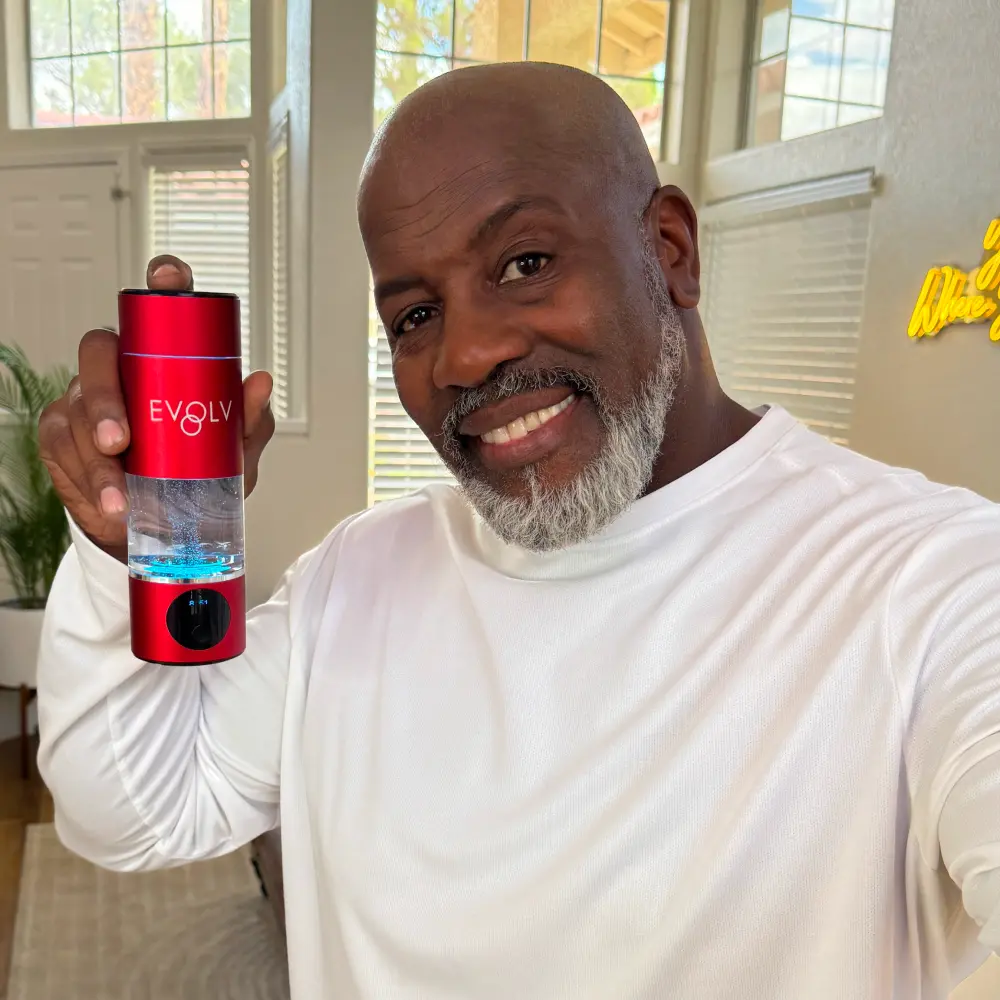
Want fresh hydrogen water anytime? Explore Evolv’s cutting-edge hydrogen water bottles designed for maximum retention. Shop now! Hydrogen water bottles are becoming a go-to tool for health-conscious people seeking better hydration and antioxidant support. But before you invest in one, it's normal to wonder: how long does a hydrogen water bottle last? And once it’s made, how long does hydrogen water last before losing its potency? If you're new to this wellness trend, or looking to upgrade your current hydrogen water setup, this guide breaks it all down for you.
How Long Does Hydrogen Water Last?
Hydrogen water is simply water infused with molecular hydrogen gas (H₂), a powerful antioxidant known for its potential health benefits. But here's the catch, those tiny hydrogen molecules don’t like to stick around.
Timing matters because H₂ is the smallest molecule in the universe, and it escapes through plastic, air exposure, and even microscopic pores. So, if you don’t drink hydrogen-rich water soon after it’s made, you’re likely missing out on its main benefit.
In this quick guide, you’ll learn:
Exactly how long hydrogen water retains its potency
What factors affect hydrogen retention
The best ways to store it for maximum H₂ concentration
Let’s make sure you’re getting the most from every sip.
How Long Hydrogen Lasts in Water
Hydrogen gas (H₂) is incredibly light and volatile, meaning it doesn’t stay dissolved in water for long, especially if exposed to air or stored in the wrong type of container. The type of storage you use can significantly affect how much H₂ you actually get when you drink. Below is a breakdown of how long hydrogen typically lasts in different storage conditions.
Open Glass
An open glass is the least effective way to preserve hydrogen in water.
Hydrogen retention time: Only a few minutes (5–10 mins max)
Why? Exposure to air allows hydrogen to escape almost instantly.
Best practice: Consume immediately after generating.
Sealed Plastic Container
Plastic containers may look sealed, but they’re often porous at the molecular level.
Hydrogen retention time: Up to 1–2 hours
Why? Plastic is permeable, and hydrogen can seep through it quickly.
Best practice: Only use if consumed shortly after filling. Avoid soft plastics.
Aluminum Container
Aluminum performs better than plastic in reducing hydrogen loss.
Hydrogen retention time: 2–4 hours (depending on seal quality)
Why? Aluminum has lower permeability, slowing hydrogen escape.
Best practice: Choose food-grade aluminum with tight seals.
Airtight Glass or Steel Container
This is a much better option than plastic or open storage.
Hydrogen retention time: 6–12 hours
Why? Airtight seals and non-porous materials slow diffusion.
Best practice: Store in a cool, dark place to further extend retention.
Evolv’s Hydrogen Water Bottle
Evolv’s bottle is engineered specifically for hydrogen retention and on-demand freshness.
Hydrogen retention time:
10–30 minutes if left open after generation.
Up to 12 hours with the cap tightly closed.
Generate fresh hydrogen on demand for max benefit.
Why? The bottle uses PEM/SPE tech and non-permeable materials for high efficiency.
Best practice: Drink immediately after generating, or seal tightly to preserve.
Why Does Duration Matter?
The benefits of hydrogen water come from the dissolved molecular hydrogen gas (H₂) in the water. But here’s the catch, hydrogen is the smallest and lightest molecule in the universe. That means it behaves a lot like a kid with too much energy: it doesn’t like to sit still and will escape at the first opportunity.
Why Hydrogen Escapes
Small size: Hydrogen molecules are so tiny that they can slip through microscopic pores in many container materials, especially plastic.
Gas behavior: Like all gases, hydrogen wants to escape into the atmosphere to reach equilibrium with the surrounding air.
No color, no warning: You won’t see or smell hydrogen leaving your water, but it’s happening the moment the container is opened or not airtight.
Everyday Analogy: Like a Soda Losing Its Fizz
Think of hydrogen water like a freshly opened soda. When you crack open a can of soda, it’s fizzy and refreshing, that’s carbon dioxide gas dissolved in the liquid. Leave it sitting open on the counter, and within an hour or so, it’s flat and lifeless. Hydrogen water works the same way, but H₂ escapes even faster than CO₂ because it's lighter and smaller. That’s why timing matters: if you wait too long, your hydrogen-rich water turns into just regular water.
The Takeaway
To actually benefit from the antioxidant and wellness potential of hydrogen water, you need to drink it fresh, ideally within minutes of generating it. Choosing the right storage container and using smart tech (like the Evolv hydrogen water bottle) helps retain those precious hydrogen molecules just a little bit longer.
Factors That Affect Hydrogen Longevity in Water
Several variables influence how long hydrogen gas (H₂) stays dissolved in water. Because hydrogen is so volatile and tiny, even subtle changes in environment or material can significantly reduce its concentration. Below are the key factors that affect hydrogen water’s shelf life:
Container Material
Plastic containers (especially PET or HDPE) are porous, allowing hydrogen to escape quickly.
Glass, aluminum, and stainless steel containers offer better retention.
Specialized hydrogen bottles are designed with low-permeability materials to retain H₂ longer.
Seal Quality
A loose or broken seal allows hydrogen to diffuse out rapidly.
Airtight caps significantly extend hydrogen retention time by preventing gas exchange with air.
Temperature
Higher temperatures accelerate hydrogen escape due to increased molecular motion.
Cooler environments slow down this process, helping maintain concentration longer.
Light Exposure
Direct sunlight or UV light can degrade water quality and speed up hydrogen loss.
Opaque or UV-resistant bottles protect H₂ content better.
Time Since Generation
Hydrogen starts escaping immediately after generation.
Maximum benefits are obtained within the first 10–30 minutes, especially if the container is opened.
Agitation and Movement
Shaking or stirring hydrogen water accelerates the release of gas from the liquid.
Keep the water still and sealed if not consumed immediately.
Water Type and Composition
Mineral content or pH level can impact how hydrogen dissolves and stays in solution.
Some minerals may bind or alter hydrogen’s behavior in water.

Best Practices for Storing Hydrogen Water and Maximizing its Concentration
To get the most out of your hydrogen water, it’s important to store it correctly and drink it at the right time. Here are the best practices to keep hydrogen levels high and benefits intact:
Use Airtight, Non-Porous Containers
Choose containers made of stainless steel, borosilicate glass, or aluminum with airtight lids. Avoid plastic unless it's specifically designed for hydrogen retention.
Store in a Cool, Dark Place
Keep your hydrogen water away from sunlight and heat, which speed up hydrogen gas escape. Refrigeration is ideal if you need to store it for a few hours.
Consume Immediately After Generation
For maximum benefit, drink the water within 10–30 minutes after it's been generated—especially if the container isn’t sealed.
Avoid Shaking or Stirring
Movement increases the surface area exposed to air and helps hydrogen escape faster. Keep the bottle still and sealed until ready to drink.
Use High-Quality Filtered Water
Start with pure, clean water. Impurities and chlorine can affect the electrolysis process and reduce the quality of hydrogen generation.
Check for PEM/SPE Technology
If you’re generating your own hydrogen water, make sure your device uses Proton Exchange Membrane (PEM) and Solid Polymer Electrolyte (SPE) tech for optimal purity and H₂ concentration.
Pro Tip: Use Evolv’s Hydrogen Water Bottle
For regular hydrogen water drinkers, Evolv’s bottle is a game-changer.
It uses PEM/SPE tech for clean, effective hydrogen generation.
The design includes low-permeability materials and tight sealing to preserve hydrogen longer.
Plus, you can generate hydrogen on demand, giving you fresh, potent H₂ water anytime, anywhere.
If you’re serious about getting the most out of hydrogen water, Evolv is the bottle to trust.
How to Test Hydrogen Levels at Home
If you’re drinking hydrogen water for its potential wellness benefits, you’ll want to make sure you're actually getting enough hydrogen in every sip. Testing the hydrogen concentration (measured in parts per million or ppm) helps you:
1.Confirm your water is still potent
2.Maximize the health value of your hydrogen generator or bottle
3.Know when it's time to drink or regenerate your water
Tools You Can Use
There are two easy options for testing hydrogen levels at home:
Digital Hydrogen Meters
Measures dissolved hydrogen in ppm (parts per million)
Provides accurate, real-time readings
Ideal for frequent or serious users
Reusable, but often more expensive
2.Hydrogen Test Strips
Color-change strips that indicate hydrogen presence in water
More affordable and portable
Great for casual testing or first-time users
Slightly less precise, but still useful for general checks
How to Test Hydrogen Levels (Step-by-Step)
Using a Digital Hydrogen Meter:
1.Generate your hydrogen water and pour into a clean glass.
2.Turn on your hydrogen meter and rinse the probe with the sample water.
3.Submerge the probe into the water (as per instructions).
4.Wait a few seconds, your meter will display the H₂ concentration in ppm.
5.A good reading is typically 1.0–1.6 ppm or higher for optimal benefits.
Using Hydrogen Test Strips:
Dip a strip into freshly generated hydrogen water for the recommended time (usually 10–20 seconds).
Remove and immediately compare the color to the provided chart.
The darker or more intense the color, the higher the hydrogen concentration.
For best results, test immediately after generating the water.
Pro Insight
Fresh hydrogen water should ideally contain 1–1.6 ppm of H₂ or more. If your readings are lower than expected, it may be due to:
Delayed consumption after generation
A leaking or poorly sealed container
Outdated or faulty hydrogen generation device
Regular testing helps you make informed decisions, and ensures you're actually getting the hydrogen you paid for.
Do Hydrogen Water Bottles Last Forever?
The short answer? No, but they’re built to last when cared for properly.
It’s important to separate two key concepts:
Hydrogen retention in the water (short-lived)
Device lifespan of the hydrogen water bottle (long-lasting with maintenance)
Hydrogen in Water Is Short-Lived
Hydrogen gas (H₂) starts escaping the moment it’s generated, because it’s the smallest molecule in the universe.
In an open glass, hydrogen may only last 5–10 minutes.
Even in a sealed container, it fades within a few hours.
That’s why fresh generation is key to getting full antioxidant benefits.
But the Bottle Itself Can Keep Going
Rechargeable hydrogen bottles are built to generate hydrogen again and again.
Premium models like Evolv use PEM/SPE technology to safely produce high-purity hydrogen.
The bottle’s lifespan can stretch into years with regular care.
Maintenance Matters: Tips for Long-Term Use
Keeping your hydrogen bottle in top shape isn’t hard, but it does make a big difference.
Charge the battery regularly (don’t let it drain to 0%).
Rinse the chamber after each use to prevent residue buildup.
Use filtered water for better performance and cleaner electrodes.
Clean electrodes monthly using a mild citric acid solution.
Store properly, avoid drops, extreme heat, or humidity.
When to Repair or Replace
Watch for these signs that your bottle may need attention:
Weak or no hydrogen bubbling during generation
Battery won’t hold charge or dies quickly
Visible mineral buildup or strange smells
Unit won’t power on despite charging
When performance drops and cleaning doesn’t help, it may be time for a replacement.
Stay ahead of hydrogen loss, upgrade to Evolv’s advanced hydrogen water bottle and make every sip count! https://tryevolv.com/
How to Tell If Your Hydrogen Water Has Lost Potency?
Hydrogen water loses its effectiveness over time, especially if not stored properly. Here are the most common signs that your H₂ concentration has dropped and it’s time for a fresh batch:
Fewer Bubbles or a Clear, Still Appearance
Freshly generated hydrogen water usually has visible bubbles and may appear slightly cloudy due to gas saturation.
If your water looks completely still or clear within minutes of generation, the hydrogen may have already dissipated.
A quiet or “flat” look in the chamber is a visual cue that potency is low.
Subtle Taste Differences
While hydrogen water is odorless and mostly tasteless, some users report a slightly “crisp” or “light” feeling when the water is freshly infused.
If your water starts tasting flat or indistinguishable from regular filtered water, it may no longer contain active hydrogen.
Low ppm When Tested
The most accurate way to confirm potency is by testing with a digital hydrogen meter or H₂ test strips.
Fresh hydrogen water typically measures 1.0–1.6 ppm or more.
If readings are below 0.3 ppm, the hydrogen concentration is too low to offer benefits.
Expert Tip
To ensure maximum benefit, generate and drink hydrogen water within 10–30 minutes, especially if your container isn’t sealed tightly. Use a reliable PEM/SPE hydrogen bottle like Evolv to regenerate fresh hydrogen water on demand and avoid guesswork.
Final Thoughts
Hydrogen water offers the most value when it’s consumed fresh and properly stored. Because hydrogen gas escapes quickly, timing and container choice play a critical role in preserving its benefits.
Drink hydrogen water soon after generation, ideally within 10–30 minutes.
Use airtight, non-porous containers like glass, stainless steel, or a high-quality hydrogen bottle to slow gas loss.
Test hydrogen levels occasionally with strips or digital meters to ensure you’re still getting therapeutic potency.
By combining smart storage practices with occasional H₂ testing, consumers can maximize the health benefits of every sip.
References
https://naturopress.com.au/blogs/hydrogen-bottle/how_long_does_hydrogen_water_last
https://ocemida.com/blogs/hydrogen-water/how-long-does-hydrogen-water-last
https://theh2therapy.com/how-long-does-hydrogen-water-last/











